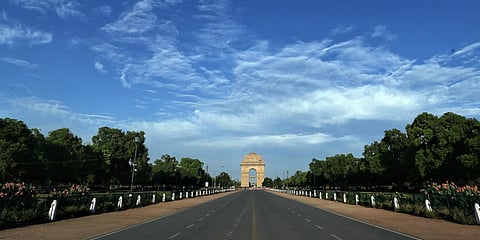

The epithet 'Wonder that was India' might be a cliche but India continues to make us wonder and confound on several counts. India that is Bharat has never been free of contradictions, but our polity always had sufficient resilience to live with them. We have allowed them to coexist without trying to forcefully reconcile them. However, in the past few years, the contradiction-load has been steadily growing, leading to cracks in national life. There is a tipping point beyond which contradictions can be self-defeating. Constantly reminding a nation about these old and new contradictions and their inherent tensions are a drag on any society as they consume the productive time and energy that should be legitimately committed to sustainable development, growth and equity.
We imagine being an Asian power and a rising global player, and take upon ourselves several geopolitical leadership initiatives. We wish to be a USD 5 trillion economy within a few years. As a developing economy, India wants to attract foreign and domestic investment. Reconstruction of the Central Vista and creation of other monuments to mark the greatness of a country celebrating 75 years of Independence are afoot in the national capital and elsewhere. In short, we have rightly created an image of grandeur for us.
The recently presented Union Budget tries to realise this vision of a new resilient India. Rightly, the emphasis is on increased capital expenditure, high-quality roads, fast trains, digital governance architecture, sunrise sectors like genomics, artificial intelligence, 5G spectrum, etc. There is the promise of e-passports, IT-based land records, National Digital Health Ecosystem, hi-tech services for farmers, Digital University and a host of ideas and innovations that would transform India into a modern superpower by 2047 when we would be celebrating a century of Independence.
Such a vision necessarily presumes a set of values like liberal economics, equity, inclusion, faith in individual enterprise, belief in technology and trust in human resource development. This vision has as its bedrock the belief in a peaceful polity where every individual is able to flourish according to his/her capabilities and enterprise. A national vision has to be rooted in a society that should have the potency to translate it into reality. Does contemporary India share this vision? Does Indian society share these values? When the ruling political party pursues a social and political vision guided by an entirely different set of values based on adversity, hatred and otherness, lofty ideals and grand aims of the government struggle for real space.
Contradictions have always plagued India. The mad Partition riots of 1947 inflicted deep wounds in the Indian psyche. The nascent India regained poise as there was an aspirational resolve in the mind of the new nation. Contradictions were aplenty in Nehru’s India, but the task of nation building, scientific temper and secular values were sufficient to override them and provide the requisite traction for the nation to move on. Political activity, government programmes and legislation converged to achieve the accepted national goals. The Constitution of India with its largeness of heart and integrative vision provided the solid bedrock in times of crisis.
However, in the recent past, this fine balance seems to have been upset by the artificial accentuation of contradictions. India today presents a sad conundrum of mutually negating ideas and attitudes. There is a reluctance to accept in humility the prevalence of hunger, malnutrition, unemployment, abysmal rural healthcare system and urban squalor. The distress in the farm sector is sidetracked by ill-informed advice, callous diagnosis and sickening remedies. The quality of public education continues to slide and the increasing presence of private players in this sector continues to heighten the already existing social disparities. The state seems to be withdrawing from several areas, exposing the hapless population to market forces. Modern terminology and hype are no substitutes for positive, compassionate action.
At the political level, outdated and abominable ideas, words and deeds continue to vitiate our social life almost unchecked. Vitriolic rhetoric and fanning of communal hatred, reinforced by orchestrated social media onslaughts, create fissures in a society that has discovered an idiom to coexist for several centuries with all differences. The majority speak a language of intolerance and exclusion, making the minorities feel unsafe and marginalised. Draconian laws are invoked even for innocuous criticism. Dissent is interpreted as subversion. Critics are silenced in more hideous ways than one. Liberal thought and secularism are suspect. National institutions of repute and autonomy have been reduced to chorus singers due to the planting of hardcore ideologues in key positions. History and science are rewritten in an alphabet of antiquity. The scientific enquiry by national institutions (including IITs) is hijacked by skewed ideologies, forcing them to undertake intellectual gig work. In a nation that is eager to emerge as a digital superpower, internet services are callously snapped due to political considerations.
Is this the society that is poised to become an Asian superpower and a digital leader? When visions and proclamations of grandeur, efficacy and technology are continuously neutralised by constitutionally unsustainable primitive laws, exclusionist acts and posturing, the nation cannot move forward. It is akin to rowing a tethered boat. For a nation to progress, and progress fast, the polity, society and economy have to share certain common vision, values and camaraderie. In the absence of that esprit de corps that can be provided only by those wielding power, all our visions of grandeur could end up as nothing short of vainglorious grandstanding for short-term political returns.
(The writer is former Kerala chief secretary & ex-VC of Thunchath Ezhuthachan Malayalam University. He can be reached at k.jayakumar123@gmail.com)